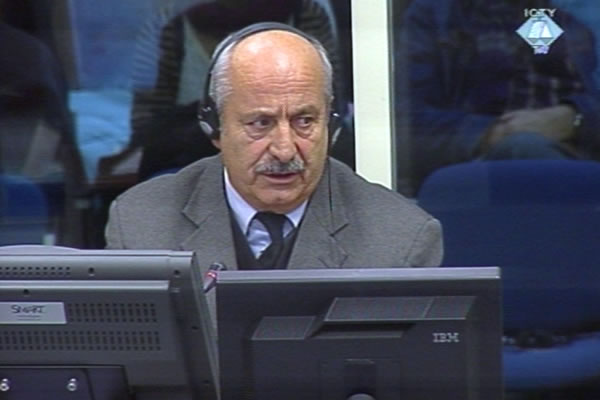Home
DID BATKO HAVE POLITICAL BACKING?
The prosecution contends that the Bosnian Serb political leadership protected Veselin Vlahovic Batko, and he was thus able to abuse and kill non-Serbs in Grbavica for months with impunity. The former president of the Executive Board of the Novo Sarajevo municipality agreed that Vlahovic could have been arrested earlier but denied that the civilian authorities supported Vlahovic
 Branko Radan, defence witness of Radovan Karadzic
Branko Radan, defence witness of Radovan Karadzic In his statement to Radovan Karadzic’s defense team former president of the Executive Board of Novo Sarajevo municipality Branko Radan said that after the first multi-party elections in BH in 1991, Muslims and Croats started arming up. Unlike them, Serbs didn’t prepare for the war, the witness claimed. Radan contends that the Serb municipal authorities tried to ensure that all the residents in Grbavica had equal living conditions.
A group of nine men was causing all the problems. The most notorious among them was Veselin Vlahovic a/k/a Batko. The men abused non-Serbs. At his meetings with the army and police, the witness insisted that they should take action to prevent the group from committing crimes. The group did not have the support of the authorities. Gradually, they managed to eliminate the group. Batko was a ‘loose cannon’ and was not under anyone’s control, the witness explained.
According to the witness, the Novo Sarajevo Crisis Staff was established in March 1992. The prosecutor then told the witness about a meeting of Serb police, civilian defense and territorial defense officials in December 1991. They met to discuss the preparations for staffing of reserve forces in the police and the Territorial Defense. According to the prosecution, this was tantamount to direct preparations for the war. The witness denied the claim, saying that Serbs didn’t prepare for the war but for defense. Serbs tried to ‘carry out preventive actions’ to prevent the repetition of crimes they suffered in World War II.
As Radan said, he first heard about Batko’s crimes in July 1992. Radan agreed with the prosecutor that a stop could have been put to Vlahovic’s crimes much earlier, in light of the fact that in September 1992 Vlahovic was still terrorizing Grbavica. The witness disagreed with the prosecution’s claim that the Bosnian Serb leadership was protecting Batko. The witness was then shown parts from Biljana Plavsic’s book Witnessings. In the book, Plavsic wrote that she informed President Karadzic, Justice Minister Momcilo Mandic and Interior Minister Mico Stanisic about the crimes in Grbavica. According to the book, Mandic ‘just snarled’ and said ‘ah, Batko’. Stanisic’s response was similar. Plavsic concluded that they were in fact Batko’s protectors. The witness rejected the claim, saying that the book was penned by Rajko Vasic ‘with a hidden agenda’, and that it was based on the memory of events since many years had passed in the meantime. The prosecutor then told Radan that based on such criteria his testimony could be even less reliable: the book was written in 2005 and Radan came to The Hague to testify seven years later.
The prosecutor also contested the claim that the situation in Grbavica improved with time, referring to the minutes of a meeting of the representatives of Novo Sarajevo municipality with Ratko Mladic and the Sarajevo-Romanija Corps command in November 1992. The president of the municipality demanded from the military police to prevent ‘crimes that were being committed on a massive scale’ because some of the fighters lacked discipline, and looting, rape and persecution were not punished. Radan agreed there were crimes but not on a large scale. Radan claimed the municipal president tried to paint the situation ‘more serious’ than it was and used dramatic expressions.
Before Radan began his evidence, Veljko Lugonja completed his testimony. Lugonja insisted that Serbs didn’t block electricity and water supply systems in Sarajevo. After Radan completed his testimony, Karadzic called Svetozar Guzina, commander of the 1st Ilidza Brigade. He will continue his evidence next week.
Linked Reports
- Case : Karadzic
- 2012-12-05 KARADZIC’S WITNESS: MUSLIMS LEFT PALE VOLUNTARILY
- 2012-12-04 VIEW FROM METALKA BUILDING
- 2012-11-30 ILIDZA BRIGADE AND ‘200 M STANDARD’
- 2012-12-07 ‘TYPICAL TERRORISM’ IN SARAJEVO
- 2012-12-11 WHAT ARE THE ‘MOST PROFITABLE’ TARGETS?
- 2012-12-12 WITNESSES DEFEND KARADZIC AND THEMSELVES
